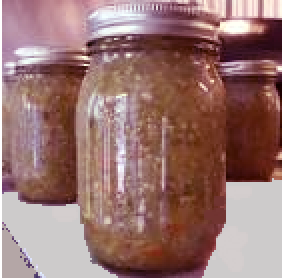Chutney was an English equivalent of a Hindu word. The condiment was probably brought back
to England first by the East India Trading company maybe as early as the 17th century. For the
Hindu and Indians, chutneys are typically eaten on special occasions such as weddings or by the
well-to-do3. Chutney, in this book, refers to condiments either fresh or cooked that contain fruit.
My recipe was originally modeled after English Major Gray Chutney. I found that by making it
spicier, the resulting chutney became a lot more interesting. This recipe is largely based on taste
and, would seem, at the outset, to be very over spiced. In actuality, vinegar moderates everything
in time and the chutney is just right after 6 months. Once canned, it will last several years. When
canning anything, you must insure all equipment is sterile. A hot jar lift and a mason jar canning
funnel would be useful otherwise hold jars with oven mitts.
Serve chutney with broiled or grilled fowl, steak, lamb, pork or roast. (It’s good on toast!)
Although preserved chutneys are available in India, nobody there has ever heard of Crosse and
Blackwell Major Grey’s Chutney.
All things chickeny and mutt'ny
Taste far better when served with chutney
This is the mystery eternal:
Why didn't Major Grey make Colonel?
Crosse and Blackwell was originally founded as West and Wyatt, the company was purchased in
1830 by Edmund Crosse and Thomas Blackwell. Today the Crosse & Blackwell brand is part of
The J.M. Smucker Company family of products. “Since 1706, Crosse & Blackwell products have captured the exotic flavors, textures and aromas of the world’s most interesting cuisines. Many of our savory products feature historic flavors connected to the culinary traditions of Great Britain. Our chutneys are boldly flavored condiments combining choice herbs, spices, and luscious tropical fruits and vegetables. Originally derived from Indian cuisine, its name comes from the word
“chatnu,” meaning “to taste.”
2 cups bottled water to start (more if needed later)
1 cup corn syrup
1 cup of Apple cider vinegar
2 cups (or more) of sugar
1 teaspoon ground cinnamon
3 teaspoons ground white pepper
1 teaspoon ground red pepper
Kosher or sea salt to taste (no iodine salt)
3 teaspoons ground coriander
3 teaspoons prepared hot mustard
1 tablespoon ground cloves (quite a lot)
½ teaspoon ground cardamom
1 ½ teaspoons ground allspice
1 teaspoon ground mace or ½ teaspoon nutmeg
A lot of fresh peeled ginger (1/3 pound) sliced thin on a mandolin.
10-15 red and green jalapeño chilies, stemmed, seeded and sliced lengthwise then in half
10 – 15 large firm mangoes, peeled, coarsely chopped. (see note 2)
2 large white onions cut wedge-wise lengthwise not in slices
10-20 large green tomatoes1, sliced length wise (squeeze out extra seeds)
1 pound golden raisins
3 tablespoon lime juice (juice from two limes)
If you don’t have access to green tomatoes, you may use more mangos.
Bring water, lime juice, salt, spices, sugar, corn syrup and vinegar to a high boil. Adjust the salt,
sugar, vinegar and water to get correct sweet-sour. The salt level should be a bit more salty at
this point to compensate for the fact we have not added the solid ingredients. Add the solid
ingredients and heat ingredients to a boil and add more water if it’s needed. Cover and boil 5
minutes. Pull off heat. When the mixture is not so hot, ladle it onto sterile quart sized mason
jars, and tighten to seal. Place sealed jars in a pot of boiling water with the water level about half
way up the jar. Boil the jars for 20 minutes. Remove for heat and cool. Set aside in a dark
cupboard for at least 6 months to mature.
Notes:
1. If you don’t have access to green tomatoes, you may use more mangos.
2. About Mangos: When ripe, mangoes are fully colored from green to yellow with a red
tinge, feel fairly firm but yield when pushed and have a fruity aroma. Do not use soft or
mushy fruit or ones that have bruises. Wash the fruit, cut off the stem about ¼ inch up so
a peeled fruit will stand upright on the cutting board. Cut off the cheeks of the fruit with a
large knife and use a smaller knife to trim around the woody core. Avoid slices too deep
that include cutting into the tough woody core. Coarsely chop the mango pieces. If you
wish to, you may use your hands to further remove some of what clings to the mango
cores over a bowl. Mango come into season around January and at peak season become
inexpensive and best flavored. (January through March)
3. Chutney is expensive at around 50~95 cents an ounce. So making your own chutney is a
real cost saver if mangoes are in season.



